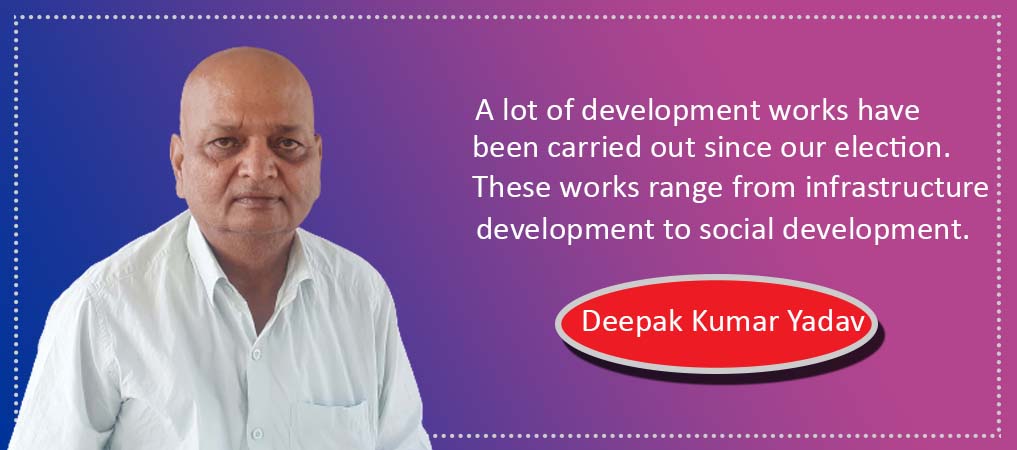I am dedicated to address people’s grievances: Yadav

Around seven kilometres east of the district headquarters Rajbiraj in Saptari is Mahadeva Rural Municipality. Made up of the former Pakari, Bathnaha, Mahadeva, Dadha and Bhagwatpur Village Development Committees, Mahadeva Rural Municipality has an area of 34.97 square kilometres and a population of 28,753, according to the 2011 census.
In the local elections of 2017, Deepak Kumar Yadav was elected the chairman of the Rural Municipality from the then Samajbadi Party Nepal. The Rising Nepal’s Saptari Correspondent Devram Prasad Yadav sat down with him for an interview. Excerpts:
It has been three years since you were elected. What works have been done since then?
A lot of development works have been carried out since our election. These works range from infrastructure development to social development. Speaking of development works, our Rural Municipality is ranked third among all the local levels in the country. Roads with drainage, temples, monasteries, mosques, school buildings, concrete bridges etc. have been constructed.
You said that a lot of development works have been carried out. Could you elaborate on the exact works done for infrastructure development?
The main and auxiliary roads of ward no. 3 have been paved with concrete and drains have been constructed. The Ram Janaki Temple has been constructed. Roads in the former Bathnaha and Dhikali have been paved with quality gravel and concrete. We have also built a building for the upgrading of the higher secondary school at Bathnaha.
During the COVID-19 pandemic, has the local government stayed close to the local people? Did the Rural Municipality encounter any obstacles?
COVID-19 not only impacted us but the entire world. Many of the Rural Municipality’s plans and projects were affected. The constructions which were scheduled to be completed at the end of the fiscal year 2019/20 were affected by the lockdown. Nevertheless, we completed most of our works on time. The citizens did face difficulties and hurdles in some areas. But we are hopeful that these problems will be solved in the next few months.
There are complaints that many conditional grant programmes like agriculture, education and health have not been effective. What is your view on this?
While it may not have been fully successful, it has been partially effective. Conditional grant programmes are the main responsibility of subject-related offices and divisions. With the help of Ram Lakhan Yadav, the administrative officer of the Rural Municipality, the grants have been successfully implemented despite the lockdown. In some cases, we have not been able to work satisfactorily because the State and federal governments have not provided adequate budget.
What areas have you prioritised for the development of the Rural Municipality?
We have prioritised education, health and infrastructure.
We have made extensive reforms in the education sector. We have conducted various programmes to attract children to schools. We have made great progress in bringing out-of-school children to schools and have greatly improved school operations and the teaching-learning environment.
Similarly, a birthing centre and health post building are under construction. We have made the health sector credible, convenient and reliable.
At many local levels, internal misunderstandings seem to have hampered their work. How is the relationship between the Rural Municipality members and the political parties here?
The relationship between the members and the political parties in this Rural Municipality is good. Everyone cooperates on matters of development. All of us are together in taking the Rural Municipality forward and improving the lives of the residents. We do not have the problems that you described in your question.
What are your plans for the long-term prosperity of the Rural Municipality?
We have classified our projects into short-term and long-term and are working as per the classification. We have formulated a master-plan for the long-term development of the Rural Municipality. If the projects are implemented as planned, no ward will be left out. We are preparing detailed project reports for roads connecting all the wards of the Rural Municipality as well as other projects.
What measures have you adopted for good governance?
We have a dedicated grievance redress officer and I have personally taken initiative to address any problems and complaints immediately. Every six months, we consult with the civil society in each of the wards. We have also tightened our monitoring system. We regularly disseminate information through our website.
What steps have you taken to prevent and treat COVID-19?
We first conducted public awareness programmes and then arranged resources and distributed relief materials. We have been managing quarantines from the very beginning of the outbreak. We have paid special attention to sanitation and mobilisation of health workers and had worked to manage free ambulances for senior citizens and expecting mothers during the lockdown. Furthermore, we have formed different committees to prevent and control the spread of the coronavirus.
Recent News

Do not make expressions casting dout on election: EC
14 Apr, 2022
CM Bhatta says may New Year 2079 BS inspire positive thinking
14 Apr, 2022
Three new cases, 44 recoveries in 24 hours
14 Apr, 2022
689 climbers of 84 teams so far acquire permits for climbing various peaks this spring season
14 Apr, 2022
How the rising cost of living crisis is impacting Nepal
14 Apr, 2022
US military confirms an interstellar meteor collided with Earth
14 Apr, 2022
Valneva Covid vaccine approved for use in UK
14 Apr, 2022
Chair Prachanda highlights need of unity among Maoist, Communist forces
14 Apr, 2022
Ranbir Kapoor and Alia Bhatt: Bollywood toasts star couple on wedding
14 Apr, 2022
President Bhandari confers decorations (Photo Feature)
14 Apr, 2022










